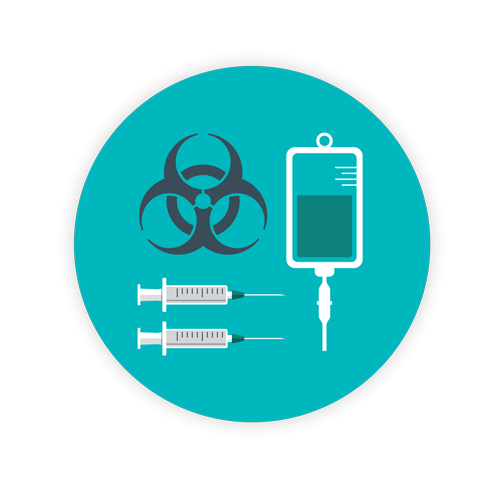Healthcare Waste Considerations for Long-Term Care Facilities

When the term “healthcare waste generators” comes to mind, it’s reasonable that most people think of hospitals. But healthcare waste generators of all sizes, ranging from a tattoo parlor to a dialysis center to hospitals and long-term care centers fall under this umbrella. One of the challenges of healthcare waste considerations for long-term care facilities is proper and compliant waste segregation.
A long-term care facility today can imply several things to different people: a skilled nursing facility, a rehabilitation center, a portion of a senior living community, an assisted living facility, or a hospice care facility.
Regardless of terminology, a long-term care center generates much the same healthcare waste as a hospital:
- Sharps
- Biohazard waste
- Red bag waste
- Pharmaceuticals (including expired drugs)
- Infectious waste
- Personal protective equipment (PPE), IV tubing and other supplies used for chronic conditions and acute care scenarios
As such, it’s important to know your regulations.
Awareness of medical waste laws essential
Awareness of federal and state regulations regarding proper medical waste management is essential for long-term care facilities. Some states refer to federal guidelines, while others add more rules to those guidelines (and they’re often more stringent). Pay attention to the wording.
Are you a small quantity generator (SQG) or a large quantity generator (LQG)? Do you know the difference between the two? In California, a small quantity generator generates less than 200 pounds of medical waste per month. In Texas, a small quantity generator produces less than 50 pounds of medical waste per month.
Is your waste stored on-site? Do you know how long you can store that waste? In Texas, this rule is found under Title 30 of the Texas Administrative Code (Environmental Quality). You don’t need a permit or registration as long as certain stipulations are met, such as the waste only consists of medical waste generated on-site, it’s stored and secured properly, and doesn’t create a nuisance.
In the state of Florida, on-site storage of biohazard waste must not exceed 30 days. Regulations of Florida’s Department of Health also specify that any and all biohazard waste be labeled with highly visible labels and hazard symbols as described in Florida Administrative Code 64E-16.004(2)(b) F.A.C.
Daniels Health knows that every state may have different definitions or interpretations of medical waste. It’s not easy to wade through hundreds of pages of regulations, whether you’re dealing with healthcare waste segregation and management for a 40-bed long-term care facility or a 300-bed hospital.
Pharmaceutical waste disposal of expired drugs in long-term care centers is also an ongoing challenge. Are you up to date on the regulations and identification of pharmaceutical waste for your county or state? A handful of governmental agencies regulate pharmaceuticals, and proper disposal is essential to avoid penalties of non-compliance. Safe and environmentally friendly management is the goal when it comes to expired drugs.
Compliance is key to avoiding fines and penalties
Even a small long-term care facility deals with the same federal and state guidelines as a major hospital when it comes to compliance. Daniels Health is aware that budgeting constraints are ongoing challenges in long-term care facilities. Because of this, some may be tempted to cut corners when it comes to healthcare waste management in order to save money.
The Environmental Protection Agency (EPA) increased fines for non-compliance in regard to hazardous waste disposal, including long-term care centers that are subject to regulations provided by the Resource Conservation and Recovery Act. A facility deemed non-compliant may be charged up to $70,000 per day. Clean Air Act violations and fines have also tripled from approximately $37,000 up to $93,000 for a single violation.
Can your facility afford that?
You may be a small long-term care center, but your reputation as well as your pocketbook rely on compliance. Improperly handled, segregated, packaged healthcare waste, and especially biohazard waste, infectious waste, and sharps waste not only runs the risk of hefty fines, but damages to your facility’s reputation. If all of your employees, from grounds-keeping to housekeeping to janitorial, to the administration staff can’t identify the waste streams generated by your facility or their proper segregation, you’re putting your facility at risk.
Do your employees know what type of trash goes where? A single employee that disposes of medical waste in a regular trash can has violated regulations that can cost your facility over $70,000 a day in penalties, even if that action was a non-intentional “mistake”.
It’s essential to ensure that your employees are properly trained, and every medical waste generator should provide guidelines in regard to medical waste disposal. It is also the medical waste generator’s responsibility to ensure that the medical waste removal company that is hired disposes of that medical waste properly. You need to know where your medical waste goes after it leaves your facility. It’s called the cradle-to-grave approach, one that Daniels Health supports.
Do it Right
Daniels Health provides solutions specifically catered to long-term care centers that reduce costs and provide safer, effective, and efficient medical waste management solutions.
For example:
- Reusable sharps container and safer sharps container placement
- Guidance on waste segregation and education about different waste streams common in long-term care centers
- Waste audit processes that identify the type and volume of medical waste generated by your facility.
It’s all about sustainability, sharps injury reduction and associated costs, as well as reducing the volume of medical waste going to landfills. Call Daniels Health to learn how we can help your facility save money and stay compliant at the same time.
